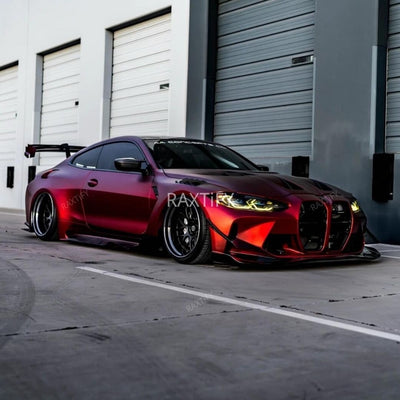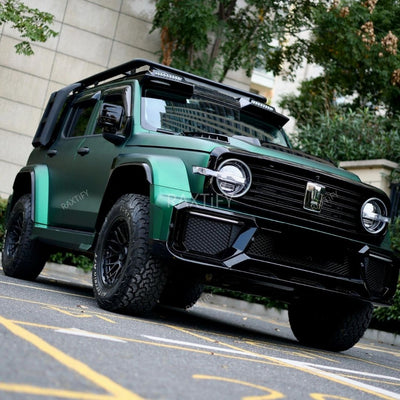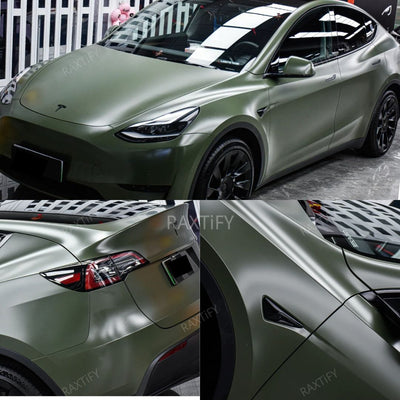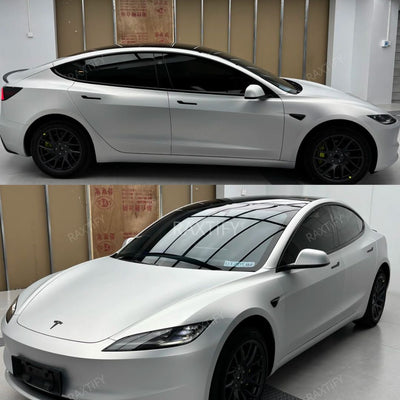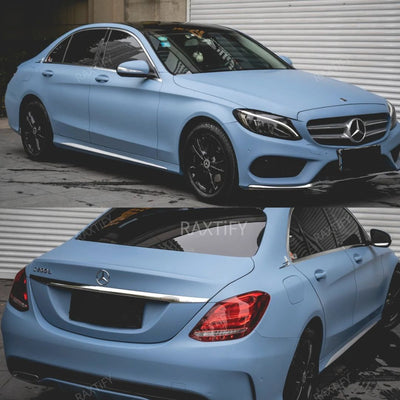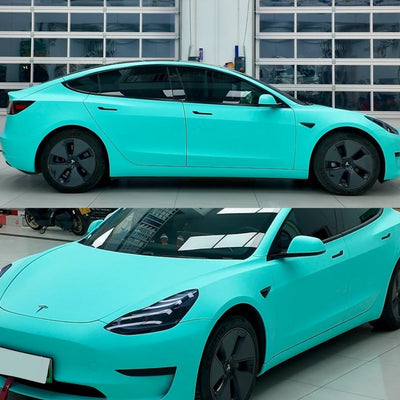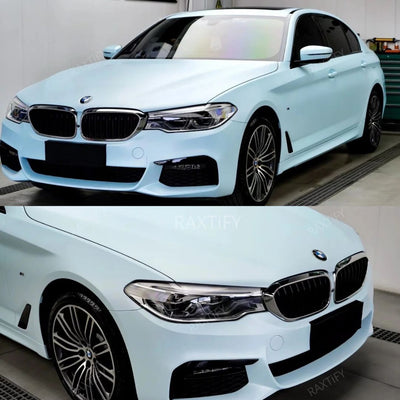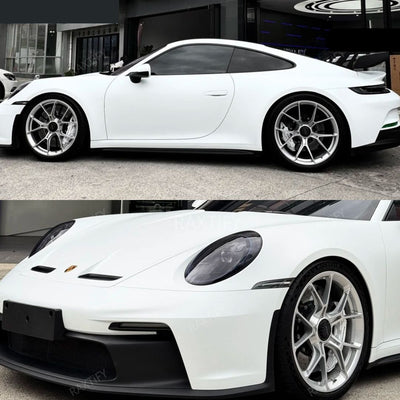
Upfront Cost Comparison: Vinyl Wrap vs. Custom Paint
Of the aspects that are immediately obvious to the majority of car owners, when comparing the vinyl wrapping and custom paint the biggest variance is the initial price, and the time taken. Although both alternatives may radically transform the appearance of a car, they require very dissimilar procedures, materials, and labor, which directly affect the cost you will pay initially.
Vinyl Wrap: Lower Upfront Cost and Faster Turnaround
Vinyl wrapping is also in the majority of occasions much cheaper than custom paint. To have a complete vehicle wrap, the cost is usually between $1500 and $4000, depending on the size of the vehicle, type of wrap material and installation skills of the installer.
Installation is one of the key factors that make vinyl wraps cheaper at the beginning. A wrap does not need sanding, priming and curing as a paint does. Rather, professional installers use pre-colored vinyl and apply it to the factory paint and this saves on labor and time in the shop.
Depending on the experience we have in dealing with installers and customers in the U.S., an entire vinyl wrap normally requires 2 to 4 days to be done. This is not only reducing the amount of labor spent but also the amount of time your vehicle is down, a huge benefit to day to day drivers.
Flexibility is another cost advantage. When you would wish to switch colors again in couple of years or back the car to its original appearance, the wrap can be removed without having the paint work permanently changed.
Custom Paint: Higher Cost with Permanent Results
Custom paint, however, is much more expensive to invest in the first place. An average paint job is usually worth about $5000 - $8000 and a high quality or show quality paint job is worth at least $10,000 and still higher.
Preparation and labor are some of the major factors that make the higher price. The surface needs a lot of preparation in the form of sanding, body work, masking, numerous layers of paint and time to dry the paint. Every step is more expensive and errors may be quite costly.
Positional change is also a permanent change in paint. After repainting a vehicle it is hard to restore it to its initial factory finish which is also expensive. This permanence is an advantage to some owners, particularly with long-term construction or old car, but should be taken into consideration when assessing overall worth.
When it comes to time, custom paint jobs require one to several weeks depending on the complexity and workload in a shop. This process is the cause of increased labor expenses and increased automobile downtime.

Factors That Influence the Cost of Vinyl Wraps or Car Paint
In the case of the cost of wrapping and painting a car, the end cost does not depend on the cost of one factor. According to actual installs and professional installer comments, there are a few critical factors that can greatly affect the amount you will pay out in whichever direction you decide. The following are the most critical cost drivers that you need to know when deciding to make a decision.
Material Type and Quality
Material quality is one of the largest difference costs in between vinyl wrapping and painting.
In case of vinyl wraps, the prices differ with great variation based on:
- Entry-level calendared vinyl vs. premium cast vinyl
- Standard gloss or matte finishes vs. specialty colors (metallic, color-shift, chrome, forged carbon)
- Backing technology and adhesive quality
Vinyl of better quality is not only more expensive in the short term, but also simpler to install, will last longer, and will not fail or raise up with time as readily, which would actually be cost-effective in the long term.
Material cost is affected with paint by:
- Paint type (single, basecoat/clearcoat, custom blends)
- Brand and chemical quality
- Other layers include clear coating or ceramic coating.
Premium paint work may be used to create depth, gloss and durability on custom paint work, which increases the cost to a great deal higher than simple resprays.
Vehicle Size and Body Complexity
Wrap and paint are significantly dependent on size and shape of your vehicle.
Naturally, larger vehicles demand:
- More vinyl or paint materials
- Longer installation or spraying time
- Additional labor for alignment and finishing
Along with size, body complexity is equally important. Motor vehicles that have aggressive bodies, broad fenders, deep curves, vents, and narrow edges take more ability and time to wrap or paint properly. This category is usually performance model, luxury cars, and SUVs.
In our real-life experience with installations, body parts that are complex may require 20-40 percent more time to install than simple ones and this directly correlates to the end cost.
Installation Time and Labor Skill
In wrapping a car, as well as painting, labor usually makes up the biggest cost element.
Vinyl wrapping normally involves:
- Precision panel alignment
- Regulated stretching and heat regulation.
- Close edge finishing and post heating.
Proficient installers are able to work quicker and achieve cleaner work, however, the skill level increases the labor rates too.
And painting is even more laborious:
- Surface preparation (sanding, priming, masking, etc.)
- Several layers of paint and periods of curing.
- Last polishing and finishing.
Due to the permanent and less-forgiving nature of paint work, good painters are very expensive - particularly custom or display work.
Long-Term Maintenance and Repair Costs
The first cost is not the only tale of the tale, the long run maintenance and repair cost is equally important.
Vinyl wraps:
- Removal and replacement are possible without interference with factory paint.
- Partial repair is permissible in case of a damaged part.
- Usually, last 3-7 years based on care and quality of the materials.
Paint jobs:
- Permanent and costlier to fix in case scratched or chipped.
- Frequently need to repaint whole panels because of color differences.
- Not fade or degrade with time unless well maintained.
A lot of owners choose wrapping in case of their daily use or leased cars, as it has flexibility and predictability in terms of cost of maintenance. Paint can be more appropriate when the long-term ownership or restoration work is at stake, and permanence is the most important factor.
Long-Term Cost: Wrap vs. Paint Over Time
The initial cost is not the whole picture when comparing vinyl wrapping and traditional paint. The cost in the long-run-duration and maintenance and repairs and flexibility are aspects that usually contribute more in deciding which of the two would actually be cheaper in the long term.
Durability and Lifespan
When well maintained and installed a high-quality vinyl wrap can last 5-7 years. Professional premium wraps may even be long lasting, particularly on vehicles held in a garage and which are not subjected to much sunshine.
Special automotive paint, however, is supposed to be permanent. The life time of a good paint job can be 10-15 years or more, although, it majorly depends on the quality of the paint, the preparation and how it gets exposed to the environment. The allegations of fading, peeling, or the lack of clear coats will become evident in lower-cost paint jobs, much earlier.
From a long-term perspective:
- Wraps are known to have a specific lifespan and replacement costs are predictable.
- Paint has a longer life but may be costly in repair after it gets damaged.
Maintenance and Repair Costs
A large difference in long run costs is in repairs.
Damage is localized with the use of vinyl wraps. When a panel is scratched or scuffed, then it is possible to re wrap that particular part of that vehicle, without going through the rest part of the vehicle. This ensures that the repair costs are kept at a fairly low and manageable rate.
Repairs of paint are more complicated. Custom paint color and blending of the panels may be expensive, in case of metallic, pearl finishes, or custom finishes. Simple damages can necessitate the process of repainting several panels to get a smooth finish.
Now with the course of time, a good number of car owners discover that:
- Wrap repairs are more affordable and more versatile.
- Repairing of paint is more costly and labor intensive.
Protection of the Original Paint
Paint preservation is another amidst-term financial consideration.
Vinyl wraps provide a protective coating, which protects the factory paint against UV rays, scratches caused on the road, road debris, and chemical exposure. The original paint beneath the wrap is usually in a better condition when the wrap is taken off compared to the similar aged vehicles that had not been wrapped.
No such protection is provided in custom paint: once a paint is damaged, it is all out of pocket.
In the case of leased vehicles or cars that you intend to resell, it is advisable to not use the paint provided by the factory to save on the reconditioning fees by ensuring that the factory paint is maintained.
Flexibility and Style Changes
Over time, tastes change. Vinyl wraps allow you to:
- Change without repainting the colors.
- Change the appearance of the car after every couple of years.
- Never make permanent changes.
A wrap replacement is very expensive, yet it is also flexible, unlike paint. Using paint, which requires the organization to completely repaint again, which can be more expensive than rewrapping.
To the fans that prefer changing the looks of their cars, wraps can be cheaper in the long-term even though they have a shorter lifespan.
Which Option Is Cheaper Over Time?
In the real world, there is no single answer, but:
- Vinyl wraps are more affordable in the long-term as a daily driver, leased car, as well as a style oriented owner.
- Paint might be better suited to long-term ownership in case you prefer permanent finish and you have no intentions of changing.
According to our experience in various installations and customer applications, wraps tend to provide a lower financial risk in the long term, as they are easier to repair, they protect the paint and also in terms of flexibility, whereas the paint requires more commitment, both in terms of financial obligation and also permanently.

Pros and Cons of Wrapping vs. Painting a Car
Pros of Wrapping a Car
1. Lower upfront cost
Vinyl wrapping is in most instances much cheaper than a quality custom paint job. A complete wrap can save thousands of dollars and still provide the impact of a transformation in how one looks.
2. Not permanent, not irreversible.
The biggest benefit of wrapping is that it can be completely removed. The original factory paint would still be intact under it, and this would be of much importance in cases of leased cars or to the car owners who would want to resell their car in future.
3. Faster turnaround time
Covering an automobile normally needs several days, but personal paintworks may require weeks. This translates to much reduced downtime in the case of daily drivers.
4. Greater selection of colors and finishes.
Color-shift, satin metallic, chrome, forged carbon, and matte textures are some of the finishes that are hard or extremely hard to do with paint using vinyl wraps.
5. Paint protection benefits
A quality wrap serves as a protective coating, which assists in protecting the original paint against UV exposure, minor scratches and road debris.
Cons of Wrapping a Car
1. Poor longevity as opposed to paint.
Vinyl wraps last 3-7 years on average based on the quality of materials and climate conditions as well as maintenance. With time, it may fade or scratch edges when exposed to the sun and heat.
2. Nonexcellent at serious bodily harm.
Wraps cannot conceal dents, deep scratches or rust. Actually, once wrapped, imperfections may be more eminent.
3. Demands expert installation.
Bad installations may result in lifting edges, bubbles or early breakdown. Best results are highly suggested to be achieved through professional installation.
Pros of Painting a Car
1. Finish that is long-lasting and permanent.
A good paint work can be lasting much more than ten years under proper care hence it is a lasting solution to people who own cars and want to keep them forever.
2. High quality and naturalism.
Paint offers a depth, gloss and texture that continues to be unsurpassed to many enthusiasts, particularly in restoration work or show cars.
3. More suitable with vehicles that are in a bad condition.
Bodywork repair, rust treatment and panel repair can be completed prior to the addition of color on the paint, leading to a more unified finish.
Cons of Painting a Car
1. Higher cost
Having custom paint jobs is costly, especially where the paint is of high quality, when it involves multi stage or special colors. Wrapping prices can easily get pushed to a very high point because of labor expenses.
2. Permanent commitment
After painting a car, it is impossible to undo the paint, so it is required to repaint once more, thereby incurring more costs and time.
3. Longer downtime
Along with the fact that paint takes a long time to prepare, cure, and finish, this means that it takes the vehicle off the road longer than a wrap does.
Which Option Makes More Sense?
In practice, through everyday experience, the vinyl wrapping is usually more suitable in cases of everyday cars, leased cars, and other owners who like changing the patterns after a few years. It provides flexibility, reduced price and extra paint protection.
Painting on the other hand is more appropriate in long term ownership cases, restoration, or a vehicle where the permanence and originality of the painting is the most important.
There is no true right or wrong answer to this, however knowing these strengths and weaknesses, then it is much easier to make a choice that suits your budget, ambitions, and driving styles.
Why Vinyl Wrap Is Often the More Practical Choice for Most Car Owners
To the majority of the average cares of a car, the reason behind the wrapping is usually practicality over perfection and in this regard, vinyl wrapping seems to be more rational than the old classic paint.
In real life terms, the cost of vinyl wraps is less, the turnaround time is shorter and the flexibility is extremely high in comparison with having a custom painted job. The entire professional wrap of the car would often take a few days, whereas quality paint work would take weeks and entail a lot of preparation, drying and finishing.
Vinyl wrap has another significant benefit that is reversibility. Wraps are also removable or replaceable unlike paint, which permanently changes the original finish of the vehicle. This is particularly attractive to leased cars, resale oriented owners or any individual who takes pleasure in changing the appearance of their car after every few years. A wrap can also in most instances assist in protecting the paint of the factory, maintaining the resale value and not reducing it.
Maintenance is also one of the factors. Although high-quality paint is beautiful, it is more susceptible to rocks, scratches, and UV paint damages and can hardly be repaired without being expensive. Vinyl wraps, however, can be repaired on a localized basis. Damaged panels can also be easily rewrapped and not repainted the whole car.
In our experience with installers and customers wraps are especially useful in:
- Daily drivers
- Leased vehicles
- Owners that prefer to switch colors or finishes.
- People who want to find a compromise between the looks and the price.
This does not mean that there is no place of paint. Often show cars or long-term construction projects can make use of custom paint since permanence is desired. However, when it concerns the vast majority of drivers who desire a clean appearance, variable expenses, and freedom, the vinyl wrap option will be more viable and adaptable.
Frequently Asked Questions: Wrapping or Painting a Car.
Q: Is car wrapping truly more affordable than car painting?
Yes, in the majority of instances, yes, however, the initial cost of vinyl wrapping is lower than that of custom paint, particularly when comparing the initial cost.
The average price of a full vinyl wrap is $2000 to $5000 whereas the average price of a good quality custom paint job ranges between $4000 to $10000 or more, which depends on the preparation, materials and labor.
Nevertheless, the end price will be extremely variable based on the size of the vehicle, the nature of finish, and experience of installer.
Q: What is the duration of a vinyl wrap as opposed to paint?
With good maintenance, a professionally applied vinyl wrap has a lifespan of 5-7 years.Instead, factory or custom paint will last 10 or more years, but only when properly maintained and not placed in harsh environments.
Real-life experience of installing wraps has demonstrated that daily driver wraps in hot climates could wear out more quickly than even paint, whereas vehicles kept in a garage could potentially extend the life of wraps long.
Q: Do car wrappings destroy original paint?
No - in proper installations and removal, vinyl wraps do not harm factory paint.Actually, wraps tend to shield the original paint against UV radiation, small scratches as well as road debris.
Nevertheless, badly painted wooden boards or cheap vinyl may make it more likely to peel off the paint when removing it, and this is why installation is important.
Q: What gives the highest resale value wrap or paint?
The wrapping tends to have a greater flexibility in terms of resale value. Wraps are easily removed; therefore, you can revert the vehicle to its original factory color and resell.
Custom paint is permanent and non-original colors can occasionally diminish the resale value except in the case where the buyer desires that finish.
Q: Does a vinyl wrap prove to be less expensive over time?
It depends on the duration of the car ownership.Wrapping may be more affordable in the long-term, in case you desire color change during a couple of years or change of style.When owning long term and there are no intention to change color, then paint can be more economical, even though it is more expensive.
Q: Is it possible to wrap or paint only some part of my car?
Yes. Each of the two can be partially customized.The most popular types of partial wraps are roofs, hoods, mirrors, and accents which are significantly less expensive than full wraps or full paint jobs.
The partial paint work is however, frequently subject to the need of blending and matching of colors that may cost more labor than the vinyl.
Q: What is more appropriate with leased vehicles?
The choice is always nearly always on vinyl wrapping when it comes to leased cars.Wraps are removable and non-permanent meaning that you can customize the vehicle without going against lease return clauses.
Q: Is it worth doing it yourself by wrapping or painting?
Vinyl wrapping can be done by yourself and is not expensive, although it takes time, tools and practice.Do it yourself painting is not very advisable as it is very hard and expensive to acquire professional results without using a controlled environment.
Q: Which is better wrap or paint therefore?
It does not have a one-fits-all answer.Wrapping is typically the best option in case you desire reduced initial expenses, design, flexibility, and protection of paint.Paint can be a good investment especially when you want a permanent finish that is long lasting.
Conclusion
It is all about what you want to achieve, what you can afford, and how you are going to use your car therefore there is no universal answer to wrapping and painting a car as to which is cheaper.
When you need a lower initial outlay, a quicker turnaround time and the option of changing the colors or designs in the future a vinyl wrap can be more viable. This is particularly applicable to ordinary motorists, lease cars or people who prefer to change the looks of their cars every few years. Depending on real-world installations, wraps are also simpler to cover the original paint and repair small damages without having to repaint whole panels.
Conversely, custom paint can be more reasonable when putting together a long term or show car and desire permanence in its finish with deep gloss or custom effects that can be hardly achieved with vinyl. Nevertheless, one should consider not only the increased initial price, but also the time, maintenance, and repair costs, which are associated with a complete paint job.
In short:
- Select a vinyl wrap in order to be affordable, flexible and to be able to reverse.
- Select custom paint when permanent is needed and you are willing to spend more money.
The most appropriate is the one that will be in accordance with your expected duration of holding the car, frequency of changing its appearance, and amount of money you can comfortably spend in the long run. This knowledge will assist you in making a decision that will make financial and practical sense.







